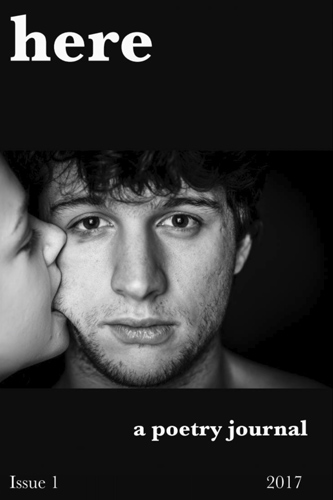Here – 2017
“. . . poetry is no more or less important now than it ever has been,” writes Professor and Editor Daniel Donaghy in the inaugural issue of Here: a poetry journal. Published out of Eastern Connecticut State University, Here engages student readers and editors for its submissions process, and seeks “diverse, wide-ranging, and powerful responses in poetry to the essential and endless questions related to ‘being here’ that are implied by the journal’s title.” After reading this first issue, there is no doubt that Here has established a place for itself.
“. . . poetry is no more or less important now than it ever has been,” writes Professor and Editor Daniel Donaghy in the inaugural issue of Here: a poetry journal. Published out of Eastern Connecticut State University, Here engages student readers and editors for its submissions process, and seeks “diverse, wide-ranging, and powerful responses in poetry to the essential and endless questions related to ‘being here’ that are implied by the journal’s title.” After reading this first issue, there is no doubt that Here has established a place for itself.
One of the best features of this publication is the fact that, of the 17 poets included, the majority have more than one poem, and in some cases, three or four works are included. It’s an editorial decision, and one that provides readers with a unique experience, seeing an author use a range of styles and content, such as in the works by Paul Martin and John Bargowski, or see a clear theme developed through several pieces, as with Amanda DeMaio and Charles Fort.
In this issue, a strong sense of story prevails in the poems, leading off with Maria Mazziotti Gillan’s works “In Third Grade I Fell in Love” which completes the title in the first line, “with language.” The speaker goes on to discuss the impact of the teacher who read to the students, and the Italian-speaking parents at home who “could not read to us in English.”
“Literature” by Paul Martin is another story in the compact exchange between a teacher and the dental hygienist, who asks
[ . . . ] after I say I taught English,
“You didn’t teach literature, did you?” wincing
at the word and recalling the teacher who called on her
after each poem, asking, “What does it mean?”
causing her to throw up her hands in exasperation
as she does now, staring at me in disappointment,
as if I were the one who embarrassed her
in the classroom silence and turned her against poetry.
Short and punchy is Chelsea Griffin’s style in her two works, “To My Jeff Buckley Lover” and “One More Time,” which includes this stanza:
a beautiful girl
in the right light
a sad girl
in the dark
clutching her glass
of red wine
singing
off-key ballads
to her empty room
And John L. Stanizzi’s “Dancing with Myself” with the epithet “So let’s drink another drink / ‘Cause it’ll give me time to think” from Billy Idol’s “Dancing with Myself” contains the lines I had to immediately stop and text to several friends because I knew they’d get it:
And if there’s a more comfortable
object to hold in the hand
than a half-pint of cheap whisky,
I’ll be damned if I know what it is
There are poems about loss—of mothers, of fathers, of sisters, of lovers—and poems that throwback to childhood memories that some may be surprised to find so fondly recalled, like Bessy Reyna’s “Sunday Afternoon Naps”:
Sunday afternoons while my parents slept
I waited crouching outside their bedroom door
for that moment when Mom would stop speaking softly,
the bed spring coils stopped squeaking,
and the snoring began.
I don’t know of many adults who want to remember their parents this way, except that, once napping, the speaker sneaks the car keys from her father’s pants’ pocket and steals away in their “red and white Chevy Bel-Air convertible [. . . ] / It was my chariot, / My Pegasus, / It was freedom.”
There are some hard-hitting works, such as Joan Seliger Sidney’s poems, unabashedly addressing anorexia in the title characters “Anne Ruaud” and “Patricia Grace Vinsonhaler,” Bessy Reyna’s “Route 99, Fresno, CA, December 27, 2015” which recounts an attack on a Sikh man, John Bargowski’s “Crossing the Street,” in which the speaker recalls witnessing a drunk get beat up and robbed, and in his “Veterans Day, Jersey City,” the ruthlessness of thieves who ransack bronzed markers from gravesites and “then roved the spangled aisles / havocking what stones / they could.”
Here: a poetry journal really does run the gamut of topic, style, emotion, and impact, leaving me laughing out loud on one page, crying the next, and texting excerpts to friends throughout. For a new publication, this first issue of Here sets its own bar pretty darn high. Provided the faculty and students continue publishing with this kind of eye for quality and support to produce such a fine print journal, I predict Here will indeed be here for years to come.
[www.easternct.edu/herepoetryjournal]





